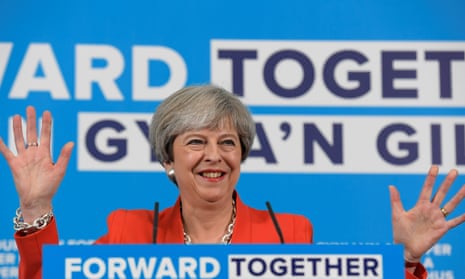Shortly after the 2005 election I asked a friend of mine if she’d voted. “No,” she shrugged. “It was obvious who was going to win.” I imagine there are a lot of people who don’t want another Tory government feeling the same way about this election, given that virtually everybody in the mainstream is predicting a Conservative victory. But the deadline to register to vote is midnight tonight, and I’m here to tell you why your vote matters – even if the Tories win.
Let’s say Theresa May is elected prime minister. Her argument is that she needs to win the election in order to go into Brexit negotiations with a strong hand. This argument is absolute nonsense, and if nothing else you should use your vote to reject such an insult to the intelligence of British voters.
In the negotiations, Britain will be up against the 27 member states of the EU. They don’t care how many people vote for the government: their interest is the EU and their own countries. As Joris Luyendijk wrote about Jean-Claude Juncker’s state of the European Union address in 2016: “It should be clear that Brexit is somewhere on page two or three of the EU priority list.”
Or, if you want more concrete evidence, look no further than the Greek referendum in 2015. In that vote, Greeks had to decide whether to accept or reject the EU’s terms for a bailout. They rejected it by a decisive margin of 61%. Did the EU care what Greek voters wanted? It did not; and a week later, the Greek prime minister Alexis Tspiras signed a deal anyway.
The next two years will be decisive for Britain’s future. You should use your vote to make sure Theresa May is subjected to as much scrutiny as possible as she negotiates Brexit behind closed doors. Giving her a big majority won’t help Britain get a better deal from the EU, but ensuring there are as many opposition MPs as possible in parliament will help make sure the government is held to account every step of the way. To that end, every single seat in the country matters – each one that doesn’t go to the Tories is another voice in parliament that will force the government to explain its decisions.
Then there are all the other issues the government makes decisions about (remember that halcyon time when British politics revolved around more than just the EU?). In 2015, the Tories were re-elected with a majority of just 12. In the first year of government, they made 24 U-turns – an average of two a month. Many of these were over really important issues, like cuts to welfare payments and providing prison services to the regressive autocratic government of Saudi Arabia. It would have been a lot easier for the Tories to transform these reprehensible ideas into law if they’d had a massive majority. MPs opposed to the government, MPs who were voted in by you, were decisive in making sure that didn’t happen. It’s understandable for people to argue that the difference between a Conservative government with a big majority and a small majority is marginal, but people live and die in those margins.
It’s true that leftwing parties need to win elections so they can implement progressive agendas. But voting is not just about installing a political party; it’s also a tool for you, the voter, to make a statement to the people in power about the kind of country you want to live in.
This is why, if you like Labour’s programme of public investment, better wages, funding the NHS, and free universal education (to name a few), you should vote Labour even if you don’t think the party will win. It’s important that the government knows what you care about. If the Tories win with very little opposition, they will think they’ve got public support to do whatever they want. You need to show them you oppose what they stand for, even if the party you do support doesn’t win, so every time they try to strip the NHS of funding, further privatise our public services or freeze wages, they feel a little bit scared.
On 8 June, use the political power you have to make a difference – whichever party wins. Don’t vote because you have a duty; vote because you have a right. Vote because this is your country too, and you deserve to be listened to. Register today to show this government you will be heard. Do it now.
